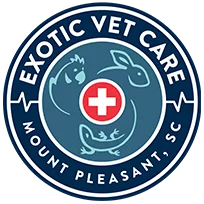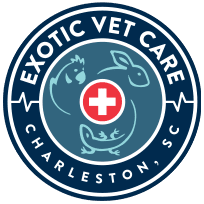Spring is coming, and with it the season of baby wildlife. Every year we receive dozens of calls from people trying to help what they believe are abandoned baby animals of all sorts. The majority of these animals are probably OK, waiting for their parent(s) to return. If however, you are certain (e.g. hit by car) that the mother cannot return, it may be tempting to collect and keep the babies at home. Here are our Top Ten reasons why you should leave their rehabilitation to the pros, and what you actually should do.

Three rehabilitated raccoon kits who lost their mother explore a stump in Colorado Springs, Colorado. Photo donated by National Wildlife Photo Contest entrant Barbara Fleming. source: https://blog.nwf.org/2014/03/8-tips-for-keeping-wild-raccoons-wild/
Note: captive bred raccoons are not legal and the species has not been domesticated long enough to make good pets. In the clinic we have noticed zero difference in temperament between wild caught and captive bred raccoons.
1. It is illegal to keep raccoons in the state of South Carolina without a permit from the DNR.
Title 50 – Fish, Game and Watercraft
CHAPTER 16 : Importation of Wildlife
SECTION 50-16-10. “Wildlife” defined. For the purpose of this chapter, “wildlife” means a member of the animal kingdom including without limitation a mammal, fish, bird, amphibian, reptile, mollusk, crustacean, arthropod, or other invertebrate.
HISTORY: 1979 Act No. 172, Section 1; 1989 Act No. 41, Section 1.
SECTION 50-16-20. Importation of wildlife for certain purposes prohibited; investigation; permit.
(A) It is unlawful for a person to import, possess, or transport for the purpose of release or to introduce or bring into this State any live wildlife of the following types without a permit from the department:
(1) a furbearer, a member of the family Cervidae, a nondomestic member of the families Suidae (pigs), Tayassuidae (peccaries), Bovidae (bison, mountain goat, mountain sheep), coyote, bear, or turkey (genus Meleagris). Furbearer includes, but is not limited to, red and gray fox, raccoon, opossum, muskrat, mink, skunk, otter, bobcat, weasel, and beaver;
Although it is not always enforced, this is the statute that covers raccoon ownership. There is no statute that makes providing veterinary care illegal, however, which is why we are able to help people with pet raccoons.
https://www.scstatehouse.gov/code/t50c016.php
2. Human and pet disease risks
At minimum, risks to people include rabies and a roundworm called Baylisascaris procyonis, which in rare cases can infect people and cause medical problems including blindness and even death. Additionally they are carriers of Leptospirosis, which is an increasingly concerning disease that can cause potentially severe liver, nervous system and kidney damage in animals and people. Other diseases such as giardia and salmonella have also been detected in raccoons. Canine distemper, which raccoons can carry, is highly fatal to unvaccinated dogs (e.g. a new puppy at home) as well as unvaccinated pet ferrets.
https://www.humanesociety.org/resources/raccoons-and-public-health
https://www.cdc.gov/parasites/baylisascaris/index.html
https://www.cdc.gov/leptospirosis/
3. Their vaccines are legally meaningless.
Raccoons can be safely vaccinated with vaccines for rabies and canine distemper that are approved for dogs and ferrets, but there will never be a vaccine officially approved for raccoons, the process is too costly. This means that there is no proof that the vaccines are effective in this species. We strongly recommend vaccinating them, but if they were to bite or scratch someone, legally they are not considered protected and the quarantine period that would apply to a dog, cat or ferret would not apply to the raccoon. Instead, the worst will happen.
https://scdhec.gov/health/diseases-conditions/insect-or-animal-borne-disease/rabies/exotic-pets-farm-animals
4. If it bites someone, your raccoon will very likely be seized and euthanized for rabies testing. And you might get sued.
We have experienced heartbreaking cases of pet raccoons biting a family member or neighbor and having to be euthanized because of rabies exposure risk as well as human safety risks due to #3 above. While most sources indicate that raccoons generally do not shed rabies virus when they are not showing symptoms, very little is actually known about the disease course of rabies in raccoons. There is also no way to test for rabies without euthanizing. In addition, if a person is seriously injured by your raccoon, they may hold you legally responsible. Your homeowners insurance will not cover this and the raccoon will have to be destroyed. Health experts are unwilling to take risks with human health in these situations, and the raccoon will pay the price.
5. They are cute.
Rule number one of pet acquisition is never to impulsively buy or keep a rescued animal, especially an exotic pet. The most common reasons people spontaneously acquire animals is because they are “cute” or they “felt sorry for them.” These are admirable sentiments, and yes, baby raccoons are adorable, smart, and dexterous. In 1 year that intelligence and dexterity can turn on you, destroy your house and pose serious dangers to household members. Even if spayed or neutered, they become especially temperamental during the breeding season, and any time they don’t get what they want.
6. “My neighbor/cousin/Grandma had them when he/she was a kid and said they were great pets.”
Raccoons are wild animals. The thing that one must always remember about them is that they are unpredictable. The lightening speed with which they can go from being seemingly OK to aggressive and dangerous is mind blowing. Ask Siegfried and Roy. Someone else’s raccoon experience in different circumstances has nothing to do with what you may have going on, and should not be used as a reason to embark on a very long and dangerous pet-owning journey.
7. They need space. Lots of it.
Raccoons are climbers, they need lots of vertical space to feel safe. They are smart and have very capable hands, and need mental enrichment to keep themselves entertained or they will pace and develop abnormal mental behaviors such as stereotypies to help them cope with the lack of stimulation. If free in the house they will jump on counters and open cupboards. Wild animals kept in captivity present a lifelong daily (15-20 years in this case) challenge to their keepers. They have to find ways to meet their behavioral, nutritional, exercise and social needs. Zoos and education centers have paid staff and volunteers whose job it is to take care of these things. Do you? If you cannot devote at minimum a room in your house, or preferably several acres on your property, you will have a difficult time giving your raccoon a good quality of life. So many of them just end up sitting and suffering in cages because they become too fractious to handle or interact.
8. Obesity, cardiovascular disease, arthritis, trauma.
The illnesses we most frequently see raccoons for, outside of vaccines, spay & neuter all have to do with improper care in captivity. Because they are omnivores like us, many people don’t take the time to educate themselves on an appropriate diet for raccoons. Many of them are fed large amounts of sweets and people food (“but he loves ice cream!”), leading to obesity, heart disease, dental disease and arthritis. Trying to then put a morbidly obese raccoon on a diet leads to severe aggression on the part of the raccoon who is not getting the goodies he is used to. This is extremely dangerous for his owners and often unsustainable.
Seemingly simple injuries or conditions that in your dog or cat might be a 10-14 day affair or require regular medication are tremendously difficult to deal with in fractious wild animals. Because they are smart, raccoons get in trouble, getting toys stuck on their hands or heads, string wrapped around their toes, into the “secured” kitchen trash to eat some moldy food causing seizures (to name a few cases we’ve seen). One recent case cost an owner over $10,000 because his raccoon had lacerated his forearm and then ripped out the stitches, and the wound became infected. This left a large open gash that had to be managed with twice weekly bandage changes (always sedated or anesthetized) and eventually surgery to close the wound, then bandage changes weekly while it healed and he repeatedly opened up parts of the incision. He had to wear 3 e-collars, a shirt attached to them and keep on a massive bandage just to prevent him from ripping it open again. They couldn’t get oral medication in to him so they had to give him shots every day. It was a nightmare that only the most dedicated human with a deep pocketbook could handle.
9. You can’t just “let it go” if things don’t work out.
Many people assume that since they are native, just letting a raccoon go will solve the problem once they are grown and too aggressive to handle. Unfortunately, you have just unleashed a potentially dangerous animal to the world who associates humans with food and has no fear of them. The chances of “your” raccoon being destroyed as nuisance wildlife or thought to be rabid/have distemper because it is approaching human homes are much higher than they would be for a wild raccoon, especially since they never learned how to get food on their own. Rehabilitators who raise orphaned raccoons go to great lengths NOT to bond with their charges and teach them to eat normal prey and forage, to make sure that they have the best chance of staying away from human dwellings once they are released. In some cases, people have kept semi-wild released raccoons on their property when they have several acres, but there is no guarantee that they will hang around.
10. You are not likely to be choosing the life for the raccoon that the raccoon would choose for itself.
It is the opinion of this practice that wild animals deserve to have lives that are free and in the wild. For a found young raccoon, the best chance for this is after being rehabilitated by a licensed and experienced rehabilitator with others of their kind. It is selfish for us to keep wildlife as pets just because we want to. If you truly love that baby, give him a chance to live his best life, doing what it was made to do.
If you find a baby raccoon or other orphaned wildlife including birds please see the following website and resources:
https://www.sciway.net/org/sc-wildlife-rescue-rehabilitation.html
Carolina Wildlife Care – Columbia – Emergency Rescue Hotline – 803-772-3994
The Center for Birds of Prey – Charleston – Emergency Rescue Hotline – 843-971-7474
Keeper of the Wild – Walterboro – Emergency Rescue Hotline – 843-636-1659
Paws Animal Wildlife Sanctuary – Waterloo – 864-683-3190
SC CARES – Georgetown – South Carolina Coastal Animal Rescue & Education – 843-546-7893
Two Hearts Wildlife Rehab – Sunset – 864-643-9876
Wildlife Rehab of Greenville Emergency Rescue Hotline – 864-233-0339
In addition, in Mount Pleasant you can drop off orphaned wildlife with the following veterinary practices who work with licensed rehabilitators:
Veterinary Specialty Care: 843-216-7554 – they will take birds, opossums, squirrels and reptiles but no rabies vectors (NO raccoons, foxes, skunks, etc.)
Pet Vet – (843) 884-7387 – mammals only (will take raccoons)
If you want to take personal and financial responsibility for the animal, then they can be seen at Exotic Vet Care by appointment or as an emergency, with all fees applicable at the time of admission.

About Us
Our exotic animal hospital is dedicated exclusively to the care of birds, exotic small mammals, reptiles, and even fish! We can offer everything your pet needs for a healthy and happy life, from wellness care and grooming to diagnostics and dentistry, but we can also provide emergency care during our opening hours, along with more specialized treatment for referred patients.
